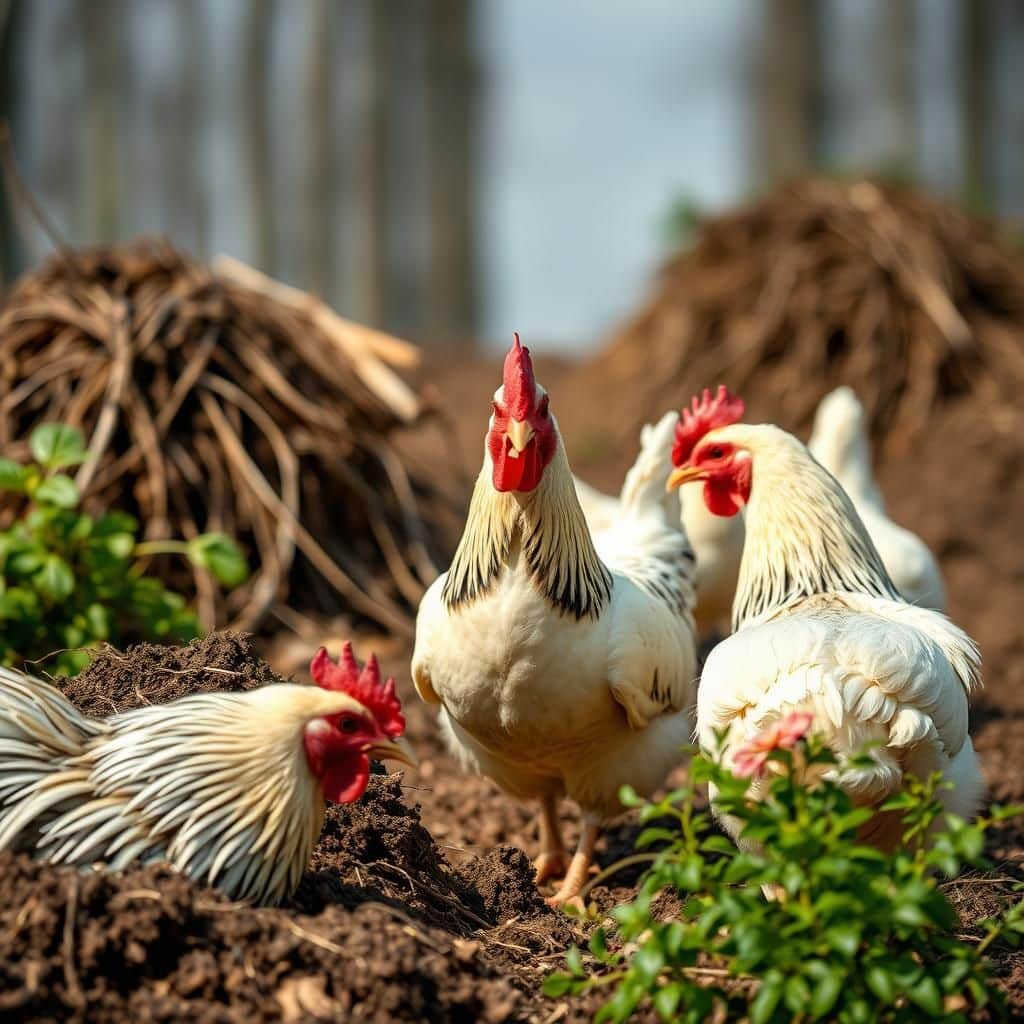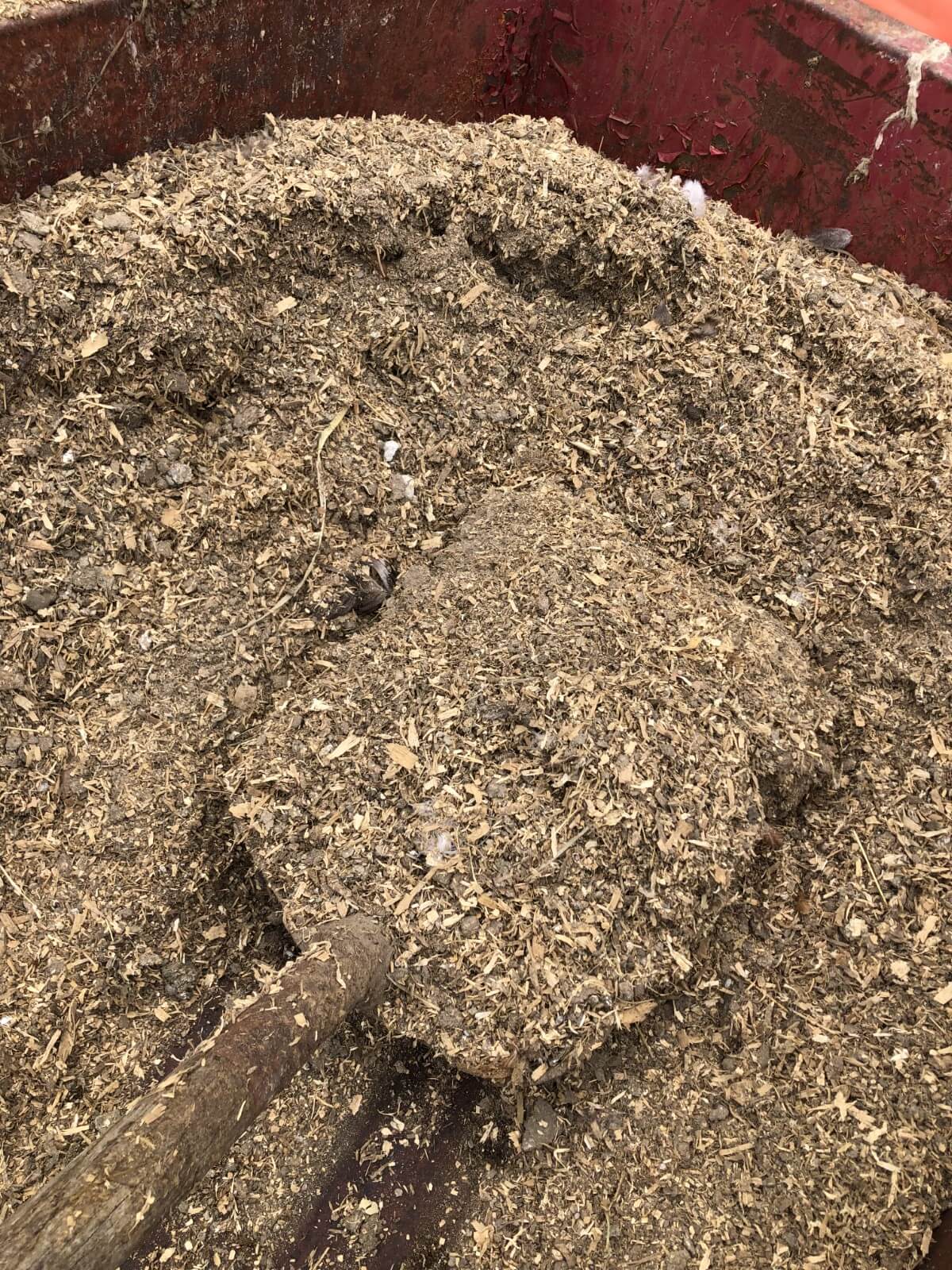Understanding the Disadvantages of Poultry Manure: What You Need to Know

Poultry manure is often hailed as a valuable organic fertilizer, enriching soil and promoting plant growth. However, its use is not without drawbacks, and understanding these disadvantages is crucial for farmers and gardeners alike. From nutrient imbalances and potential pathogen contamination to environmental concerns such as nutrient runoff and odor issues, poultry manure can pose significant challenges if not managed correctly. This article aims to shed light on the lesser-known disadvantages of poultry manure, providing insights that will help you make informed decisions about its application in agricultural practices. Knowing these pitfalls can lead to more sustainable and responsible use.
Disadvantages of Poultry Manure
Poultry manure, despite its benefits as a fertilizer, brings along several significant disadvantages that can impact both agricultural practices and the environment. One major concern is its high nitrogen content, which, if not managed properly, can lead to nitrogen leaching into water sources, resulting in eutrophication. Additionally, poultry manure can harbor pathogens and pests, posing risks to both plant health and human safety. Its application can also cause a temporary imbalance in soil pH levels, which can adversely affect crop growth. Furthermore, the odor resulting from poultry manure can lead to discomfort for nearby residents and can be a considerable nuisance. Lastly, improper handling and storage can result in nutrient losses and greenhouse gas emissions, further contributing to environmental concerns.
High Nitrogen Content
Poultry manure is characterized by its high nitrogen content, which is beneficial for plant growth. However, this abundance of nitrogen can lead to nutrient runoff if not managed appropriately. When excess nitrogen enters waterways, it can cause eutrophication, leading to algal blooms that deplete oxygen in water bodies, harming aquatic life and affecting water quality.
Pathogen Contamination
Another significant disadvantage of poultry manure is its potential for pathogen contamination. Manure can contain harmful bacteria and viruses, which may pose health risks to humans and animals if the manure is not treated or applied correctly. The presence of disease-causing microorganisms can lead to crop contamination, making food safety a critical concern for farmers utilizing poultry manure.
Soil pH Imbalance
The application of poultry manure can disrupt the soil pH balance temporarily. Ideally, the pH of soil should be maintained within a specific range for optimal crop growth. Overapplication of poultry manure can lead to soil acidification, which can adversely affect nutrient availability, leading to poor plant growth and yield.
Odor Issues
The use of poultry manure is often associated with unpleasant odor issues. The strong smell can be a significant nuisance for nearby residents and neighborhoods, leading to conflicts between farmers and local communities. The management of odorous emissions is essential to maintain good relations and comply with local regulations regarding agricultural practices.
Greenhouse Gas Emissions
Improper handling and storage of poultry manure can lead to considerable greenhouse gas emissions, particularly methane and nitrous oxide. These gases are potent contributors to climate change, and their release during the decomposition process can negate the environmental benefits of using manure as fertilizer. Sustainable practices are necessary to minimize these emissions and their impact on the environment.
| Disadvantage | Description |
|---|---|
| High Nitrogen Content | Leads to nutrient runoff and eutrophication. |
| Pathogen Contamination | Risk of harmful pathogens affecting human and animal health. |
| Soil pH Imbalance | Can cause temporary soil acidification, affecting crop yield. |
| Odor Issues | Strong smell can offend nearby residents, causing conflicts. |
| Greenhouse Gas Emissions | Improper management leads to emissions contributing to climate change. |
When should you not use chicken manure?

When considering the use of chicken manure as fertilizer, it is essential to recognize scenarios in which it should not be used. Here are instances where using chicken manure might be counterproductive or harmful.
In Areas with High Soil Nutrient Levels
Using chicken manure in soils that already have an abundance of nutrients can lead to nutrient imbalances. When the soil is saturated with certain nutrients, additional fertilization can cause toxicity rather than beneficial growth. This might result in:
- Over-fertilization, affecting plant health negatively.
- Decreased availability of essential nutrients as plants struggle to absorb them.
- Potential environmental contamination due to nutrient runoff.
In Gardens with Sensitive Plants
Certain plants, especially those that are nutritionally sensitive, may react poorly to the high nitrogen content found in chicken manure. If introduced, it may lead to issues such as:
- Leaf burn due to excess nitrogen.
- Growth stunting, where plants do not thrive as expected.
- Disruption in the natural growth patterns of these sensitive species.
When Soil pH is Under or Over Optimal Levels
Chicken manure can influence soil pH, sometimes raising it due to the alkaline nature of chicken litter. If the soil's pH is already unsuitable for the desired crops, the manure can exacerbate problems like:
- Increased acidity that may harm root systems.
- Alkalinity that disrupts nutrient uptake.
- Unfavorable conditions for beneficial soil microorganisms.
During Certain Stages of Plant Growth
There are critical growth phases in which plants are particularly sensitive to changes in nutrient levels. For example, applying chicken manure during flowering or fruiting stages can be harmful due to:
See also:
- Excess nitrogen leading to lush foliage at the cost of flowers or fruits.
- Possible nutrient lockout, preventing the uptake of vital elements.
- Increased susceptibility to diseases and pests due to excessive growth.
In Wet or Flood-Prone Areas
Using chicken manure in areas that are prone to flooding or have heavy rainfall can pose serious risks. The excess moisture can lead to:
- Increased runoff, causing nutrient loss and potential water pollution.
- Leaching of nutrients, making them unavailable for plant uptake.
- Higher risks of bacterial growth and diseases affecting both soil and plants.
What plants benefit most from chicken manure?

Chicken manure is an excellent organic fertilizer that provides a wealth of nutrients beneficial for various plants. Its rich composition of nitrogen, phosphorus, and potassium (often referred to as NPK) makes it particularly advantageous for several types of vegetation. Here are some plants that benefit most from chicken manure:
Vegetables
Vegetable plants are among the top beneficiaries of chicken manure due to their high nutrient requirements for vigorous growth. The application of chicken manure can lead to enhanced growth, better yield, and improved overall health.
- Tomatoes - They thrive on the nitrogen and phosphorus available in chicken manure, which support strong root systems and vibrant fruit production.
- Leafy greens - Crops like spinach and lettuce require a lot of nitrogen, which chicken manure provides, resulting in lush foliage and rapid growth.
- Root vegetables - Carrots and potatoes benefit from the balanced nutrients found in chicken manure, promoting larger and healthier crops.
Fruits
Fruit-bearing plants also exhibit significant improvements when treated with chicken manure. The nutrients not only enhance growth but also improve fruit size and taste.
- Berries - Plants like strawberries and blueberries show enhanced growth and berry size when fertilized with chicken manure, which supplies necessary trace elements.
- Fruit trees - Young trees such as apple and peach trees flourish with the help of chicken manure, gaining critical nutrients to develop strong branches and roots.
- Citrus plants - Lemon and orange trees benefit from the slow release of nutrients, which supports healthy foliage and abundant fruit production.
Herbs
Many herbaceous plants respond favorably to the application of chicken manure. The nutrients provide strong growth, which is essential for the aromatic compounds they produce.
- Basil - This herb, which requires healthy growth conditions, thrives when chicken manure is used, resulting in more flavorful leaves.
- Oregano - Nutrient-rich chicken manure helps bushy growth in oregano plants, enhancing their aromatic qualities.
- Parsley - This biennial herb benefits greatly from chicken manure, leading to robust and healthy plants full of flavor.
Annual Flowers
Chicken manure is beneficial for various flowering plants that provide vibrant color in gardens. The nutrients help promote blooming and overall vitality.
- Marigolds - These flowers thrive in nutrient-rich soils and show a significant improvement in blooming when fertilized with chicken manure.
- Petunias - Chicken manure fosters lush growth and supports the production of vibrant blooms, making them more resilient.
- Sunflowers - A nutrient boost from chicken manure leads to stronger stems and larger heads on sunflowers, enhancing their overall appearance.
Perennials
Perennial plants can also benefit from the organic matter and nutrients found in chicken manure, enhancing their growth for multiple seasons.
- Hostas - These shade-loving plants gain from the composting process of chicken manure, leading to bigger leaves and more vigorous growth.
- Daylilies - They require good soil fertility for optimal blooming, and chicken manure provides the necessary nutrients to support this.
- Astilbes - This perennial goes especially well with chicken manure, which aides in their growth in moist conditions, creating lush flower clusters.
What plants don't like chicken manure?

Chicken manure is a popular organic fertilizer favored for its high nutrient content, particularly nitrogen, phosphorus, and potassium. However, not all plants thrive when exposed to chicken manure. Some species can be adversely affected due to the high nitrogen levels or the presence of pathogens. Here are some plant types that generally do not respond well to chicken manure.
1. Sensitive Leafy Greens
Certain leafy greens are sensitive to the high nitrogen content in chicken manure, which can lead to overly lush foliage that lacks flavor and texture. Examples of these plants include:
- Spinach - Excess nitrogen may lead to a rapid growth cycle, causing the leaves to become tough and bitter.
- Lettuce - Over-fertilization can make lettuce susceptible to diseases and pests, adversely affecting its quality.
- Kale - Similar to other leafy greens, excessive nitrogen can lead to robust growth, detracting from its desirable taste.
2. Certain Root Vegetables
Root vegetables often struggle with high nitrogen fertilizers, which can lead to poor quality produce. Root veggies that may not thrive with chicken manure include:
- Carrots - High nitrogen can cause forked or malformed roots, impacting the plant's growth.
- Radishes - Over-fertilization can lead to slower growth and underdeveloped root systems.
- Beets - Excess nitrogen can stimulate foliage growth at the expense of root development, leading to smaller beets.
3. Some Flowering Plants
Many flowering plants prefer balanced nutrients rather than the high nitrogen offered by chicken manure. Plants that may not like chicken manure include:
See also:
- Petunias - While these flowers need nutrients, too much nitrogen can lead to lush leaves but fewer blossoms.
- Marigolds - Excess nitrogen may impair their natural pest-repelling properties, making them less effective as companion plants.
- Pansies - High nitrogen fertilizer can cause weak stems and poor flower production.
4. Herbs Sensitive to Nutrients
Some herbs are sensitive to nutrient levels and flourish in less fertile conditions. These include:
- Basil - Too much nitrogen can lead to a decline in the herb's aromatic qualities.
- Cilantro - Excessive nitrogen may cause cilantro to bolt prematurely, leading to a shorter harvest period.
- Sage - High nutrient levels can cause sagging foliage and a reduction in essential oils.
5. Acid-Loving Plants
Chicken manure tends to be more alkaline, which can be unsuitable for certain acid-loving plants. The following plants may not thrive well with chicken manure:
- Blueberries - They require acidic soil, and the alkalinity from chicken manure can harm their growth.
- Azaleas - These plants prefer acidic conditions; hence, chicken manure can adversely affect their health.
- Rhododendrons - Similar to azaleas, these plants may experience reduced blooming and overall vigor due to alkaline soil conditions.
Can you put too much chicken manure in soil?

Chicken manure is a popular organic fertilizer that provides essential nutrients for plant growth. However, it is crucial to understand the implications of its application in soil. Yes, you can put too much chicken manure in soil, which can lead to several negative consequences.
When applied excessively, chicken manure can result in nutrient imbalances, high salt concentrations, and potential contamination of soil and water. The key nutrients in chicken manure include nitrogen, phosphorus, and potassium. While these nutrients are vital for plant health, excess amounts can be detrimental.
Understanding Chicken Manure Composition
Chicken manure is rich in organic matter and nutrients, making it a beneficial addition to soil. Here are its primary components:
- Nitrogen: Crucial for leaf and stem growth, but excess can lead to burning plants.
- Phosphorus: Important for root development and flowering; however, too much can cause environmental runoff.
- Potassium: Aids in overall plant health, but in large quantities can disrupt the balance of other nutrients.
Effects of Over-Application of Chicken Manure
Applying too much chicken manure can lead to several adverse effects on the soil and plants:
- Soil Salinity: High concentrations of salts can impede water absorption by plants.
- Nutrient Imbalance: Too much nitrogen can inhibit the uptake of other essential nutrients.
- Environmental Contamination: Excess nutrients may runoff into water systems, causing eutrophication.
Signs of Over-Fertilization
Recognizing the signs of over-fertilization is essential for maintaining healthy plants:
- Leaf Burn: Tips of leaves turning brown or yellow indicate too much nitrogen.
- Stunted Growth: Plants may not grow as expected if nutrient levels are out of balance.
- Wilting: Plants may wilt due to root damage or salt stress from excessive fertilizer.
Best Practices for Chicken Manure Application
To safely use chicken manure without causing damage, consider these best practices:
- Composting: Composting chicken manure before application can reduce pathogen levels and odors.
- Testing Soil: Regular soil testing can help determine the nutrient needs of your soil.
- Applying in Moderation: Following application guidelines and using small amounts can prevent over-fertilization.
Alternatives to Chicken Manure
If concerned about the risks of chicken manure, consider these alternatives:
- Compost: A well-balanced compost can provide nutrients without the risk of over-fertilization.
- Plant-Based Fertilizers: Alternatives like bone meal or blood meal can also supply essential nutrients.
- Cover Crops: Planting cover crops can enhance soil fertility naturally through green manure.
Questions from Our Readers
What are the disadvantages of using poultry manure in agriculture?
Poultry manure can introduce several environmental risks when used in agriculture, such as nutrient runoff, which can lead to water pollution. Additionally, its high nitrogen content may cause plant burn if over-applied, and the pathogens present in raw manure can pose health risks to humans and livestock.
How does poultry manure affect soil pH?
The application of poultry manure can lead to an increase in soil pH levels, making the soil more alkaline. This change in pH can negatively impact nutrient availability, potentially harming plant health if not managed properly.
Are there any specific health concerns associated with poultry manure?
Yes, using poultry manure can pose various health concerns, as it may contain pathogens such as Salmonella and Campylobacter. These microorganisms can survive in composted manure and create a risk of transmitting diseases to humans if proper handling and application practices are not followed.
See also:
Can poultry manure lead to nutrient imbalances in crops?
Yes, the high nutrient concentrations in poultry manure, particularly nitrogen and phosphorus, can lead to nutrient imbalances in crops. Over-application may result in excessive growth of certain plants while inhibiting the uptake of other essential nutrients, ultimately affecting crop yield and quality.

If you want to read more articles like Understanding the Disadvantages of Poultry Manure: What You Need to Know, we recommend you check out our Fertilise category.
Leave a Reply
Related Articles